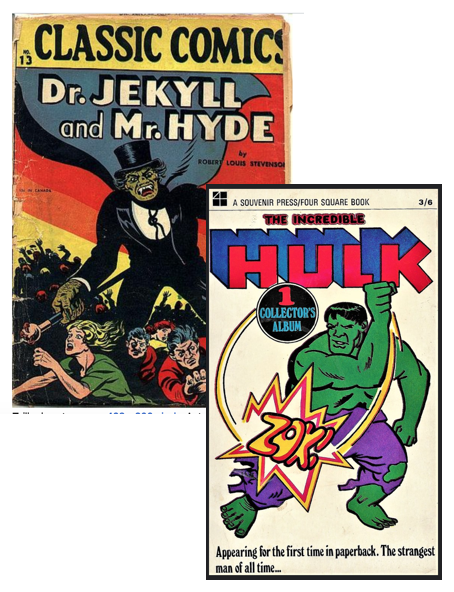
Why read the classics?

Looking for a novel to share with your students? With more than 10,000 young adult novels published annually, the choices are vast. With such an extensive collection, there is certainly something for every niche and for everyone. I would suggest, however, that you look no further than the classics. Why read the classics? This post gives 5 reasons why classic literature benefits students.
#1 - Rigor

Studying classic literature is the backbone of a rigorous education. Reading the classics is challenging and requires your students to slow down and concentrate. Take for, example, the first line of The Strange Case of Dr. Jekyll and Mr. Hyde:
Mr. Utterson the lawyer was a man of a rugged countenance that was never lighted by a smile; cold, scanty and embarrassed in discourse; backward in sentiment; lean, long, dusty, dreary and yet somehow lovable.
Lines like “backward in sentiment” and describing a person as “dusty” might make you stop and think, and you may need to read that opening line more than once to really take it in, which is precisely my point.
Spencer Baum takes the case for studying the classics even further arguing that classic literature is essential in this age of social media where we have become shallow skimmers who are addicted to entertainment instead of readers. Sadly, his argument resonates.
Why read the classics?
# 2 - Vocabulary
College-bound words (aka SAT vocabulary) are routinely found in classic literature. Going back to just the first line of Dr. Jekyll and Mr. Hyde we find:
- countenance
- scanty
- discourse
- sentiment
- dreary
There is more to vocabulary building than learning lists of words. Research shows that a person needs multiple exposures to a word in a variety of contexts for true vocabulary acquisition. A story which introduces a word is far better than a list since it gives the word context, making the word more applicable and memorable.
You may think that young children can’t handle the advanced vocabulary found in classic literature, but, as author and education consultant Michael Clay Thompson argues, if children can learn words like tyrannosaurus rex, what’s stopping them from learning other complicated words? Younger students may not have the decoding skills or fluency to handle reading classic literature, but reading advanced texts aloud to your students can help bridge that gap.

Using abridged and graphic novels can also serve as gateways to original, classic literature. This may seem like cheating, but abridged versions that better meet a child’s reading level help build the surface knowledge to handle the original text later on as reading matures. It also introduces the developing reader to the timeless themes found in the classics.
As a parent, it used to frustrate me to take my children to museums to find them hurrying through the displays slowing down only for a lever they could pull or for an exhibit that was particularly stunning. I wondered if they were learning anything at all. Research shows, however, that even surface knowledge builds understanding (Robert J. Monsanto, Building Background Knowledge). Imagine coming across the term Bayesian probability. I may have never encountered this term before and may only have a limited or no knowledge of what probability is. If I know that probability is the likelihood of an event, I can figure out that Bayesian probability is some version of figuring out the likelihood of an event. If I only know that probability is a math term, I have a lesser understanding, but I am at least a little clued into what the phrase might be about. Even limited knowledge helps a learner understand new material more fully compared to the learner who is encountering material for the very first time.
#3 - Reading impacts writing.

It’s no surprise that the research shows that children who read extensively become better writers. While reading, students pick up on text structure and language. This, in turn, transfers to their own compositions. It’s not just the structure and the use of language, but a reader also picks up on techniques for telling a story, ways to describe characters, and plot. Literary classics go a bit further as they provide archetypes that have inspired generations of writers. These archetypes can inspire the writing of your students, too!
Why read the classics?
#4 - Cultural Literacy

Cultural Literacy, which incorporates the concept of archetypes, is a term invented by E.D. Hirsch. It is the notion that there is a body of information, including literature, that an educated member of society should know or be exposed to. Hirsch argues that this idea of cultural literacy ties us together as a people. Although the debate continues on what should be included in this canon of cultural literacy, Hirsch’s point is quite valid. Look no further than cartoons. Cartoons often times reference classic literature. Even the first SpongeBob Squarepants Movie is based on the Odyssey!
A viewer who doesn’t see the reference can still enjoy the work, but the viewer who does has an ah-ha moment and a heightened experience. There is an innate and even smug satisfaction in getting it and in being in the know. The viewer who understands the reference is connected to something bigger, to something more than what is presented at face value.
Why read the classics?
#5 - Content
The classics are surprisingly modern and readable because of their themes. They address the timeless questions and struggles of what it means to be human. They bridge us to the past, whose themes we still grapple with today. Take, for example, the themes in Dr. Jekyll and Mr. Hyde – the duality of nature, repression, the dangers of unchecked science.
Need help getting started with reading the classics with your students?
Check out the below resources!
If you're interested in studying the classics via literature circles, learn more here!
Why read the classics? You are certain to find a novel for every niche in today’s vast market of literature, but you are also certain to find something for everyone in any piece of classic literature.
©Tuiolosega 2019


















